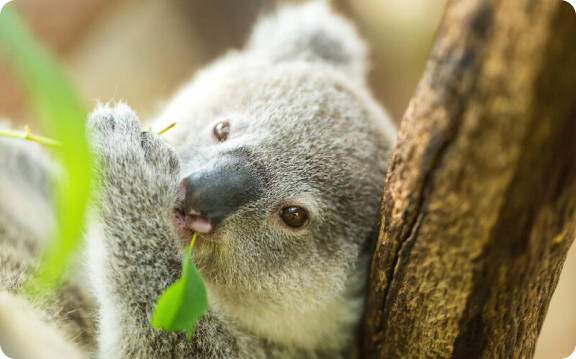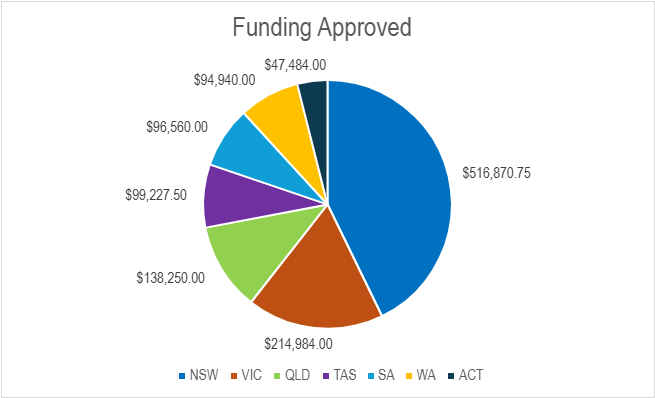Research
Grants Program
- Home
- What We Do
- Wildlife Programs
- Research Grants Program
WIRES Research Grants Program
WIRES launched a dedicated Research Grants Program in 2022, following the Black Summer Bushfires, to invest in research supporting the wildlife sector, nationally. The Research Grants Program was designed to address the significant knowledge gaps surrounding Australian wildlife and their habitats, and it was proudly supported by the Royal Zoological Society of New South Wales.
The Research Grants Program was developed to support wildlife research across Australia, focused on proposals that had tangible, positive and ideally long-term outcomes for wildlife. Funding granted through this program was available for up to three (3) years, with grants administered through WIRES.
The overall objective of the WIRES Research Grants Program was to:
- Identify and address current research gaps that result in evidence-based approaches to objectively reduce future risk to and improve the health and habitats of Australian native species.
- Advance scientific research into key issues impacting Australian wildlife and habitats through strategic investment.
- Raise awareness and implementation of proven wildlife rehabilitation and conservation methods.
- Promote best practice emergency preparedness and response in the context of wildlife conservation.
The program aimed to support robust scientific research, leading to evidence-based practices. It was a competitive grants program, and an assessment panel was set up to evaluate eligible applications. Assessments were based on the proposed project, value for money, collaborative opportunities, funding priorities, and demonstrated need. Ideal projects would reduce the likelihood of wildlife requiring rescue and rehabilitation, provide scientific-based evidence for the improvement of rescue and rehabilitation methods, improve post-release outcomes for rehabilitated wildlife, and aid the recovery of wild populations and their habitats, all of which would improve long-term ecological outcomes in Australia.

Project Categories
- Risk-Reduction - Research to help reduce the likelihood of wildlife requiring rescue and rehabilitation.
- Rescue and Rehabilitation - Research to improve rescue and rehabilitation methods.
- Release - Research to improve post-release outcomes for rehabilitated wildlife.
- Recovery - Research to aid the recovery of wild populations and their habitats.

Grant Recipients
WIRES committed $1.5 million dollars to a three-year Research Grants Program to be rolled out from 2022-2024. Over $1.2 million was committed to the successful projects and the remaining funds will be used to support more critical wildlife research.
View the successful grant recipients for 2022, 2023, and 2024:
Grant Recipients 2022
2022 - Successful Grant Recipients and Projects
Spread across 5 States there were 12 successful projects in 2022.
NSW
- Can plant volatiles and bedding material attract Australian birds and mammals to nest boxes and chainsaw hollows? - Charles Sturt University
- Building an evidence-base to inform post-fire wildlife provisioning of food and water - Taronga Conservation Society Australia
- Koalas, genotyping, trackers, and drones: Using thermal imaging, novel VHF/GPS tracking technology and genotyping to enhance post-release outcomes for rehabilitated koalas and support the recovery of the Port Stephens koala population - University of Newcastle
- Habitat restoration for threatened bats in critically endangered woodland - University of Sydney
- Eyes and ears on recovery: developing a smart sensor network for post-megafire biodiversity recovery - University of Sydney
QLD
- Reducing tick paralysis mortalities in the endangered spectacled flying fox - University of QLD
- Development and Validation of a Loop-Mediated Isothermal Amplification (LAMP) Diagnostic Assay for Rapid Detection of the Chytrid Fungus Batrachochytrium dendrobatidis in Frogs - Currumbin Wildlife Hospital (LCI) & University of QLD
SA
- Securing the health and viability of koala populations in post-fire landscapes - Flinders University
- Gastrointestinal microbiome changes with the onset and progression of the disease oxalate nephrosis in koalas - University of Adelaide
TAS
- DNA demography for evidence-based seabird recovery - University of Tasmania
VIC
- Quantifying harmful lead exposure in Australian raptors - University of Melbourne
- Rapid diagnostic testing for a severe lizard respiratory virus - University of Melbourne
WIRES is proud to be able to support these fantastic groups and projects, and we look forward to sharing the project updates and outcomes as they take place.
Grant Recipients 2023
Approved projects for Research Grants Program 2023 cover a wide range of research topics across 4 states:
NSW
- Quantifying heavy metal and anthropogenic contaminant exposure in platypus (Ornithorhynchus anatinus) populations in a World Heritage Area - Western Sydney University
- Parasites, pathogens and population health: investigating threats to the endangered greater glider in NSW - University of Wollongong
- Possum on a hot-tin roof! Assessing treatment and release outcomes for critically endangered possums burned during extreme heat events in Western Australia - University of Sydney
- Strengthening Wildlife Rehabilitation: Advancing Scientific Literacy and Best Practices for the Care and Management of Injured Turtles by Wildlife Carers - Western Sydney University
- Deploying artificial refuges for threatened fauna in fire-prone landscapes - Charles Sturt University
- The marsupial gut microbiome: improving rearing and release outcomes by supporting the development of host-associated gut microbial diversity - La Trobe University
VIC
- Disentangling the long-term effects of marine debris on Australian fur seals – Monash University
QLD
- Understanding the prevalence and impact of other bacterial, viral and chlamydial co-infections in koalas - University of the Sunshine Coast
TAS
- Vectors and victims: East Australian Pathogen Surveillance for Australia's Threatened Marine Birds (EA-PATH) - University of Tasmania
Grant Recipients 2024
Approved projects for Research Grants Program 2024 cover a wide range of research topics across 5 states and territories:
NSW
- Reducing the risk to wildlife from the illegal pet trade - University of New South Wales
VIC
- Field trials of moxidectin to treat sarcoptic mange in wombats - The University of Melbourne
- Behaviour and habitat patterns of birds of prey rehabilitated and released back into areas of western Victoria - Federation University Australia
Qld
- Establishing vital roost characteristics to facilitate urban insectivorous bat conservation - University of the Sunshine Coast
ACT
- Reducing the impact of the deadly amphibian chytrid fungus on native frogs in the wild - University of Canberra
WA
- How to stop possums falling from the trees? Strengthening ngwayir (western ringtail possum) resilience in the face of a changing climate and fire regime Department of Biodiversity, Conservation and Attractions
- Protecting released western ringtail possums from fox predation - The University of Western Australia